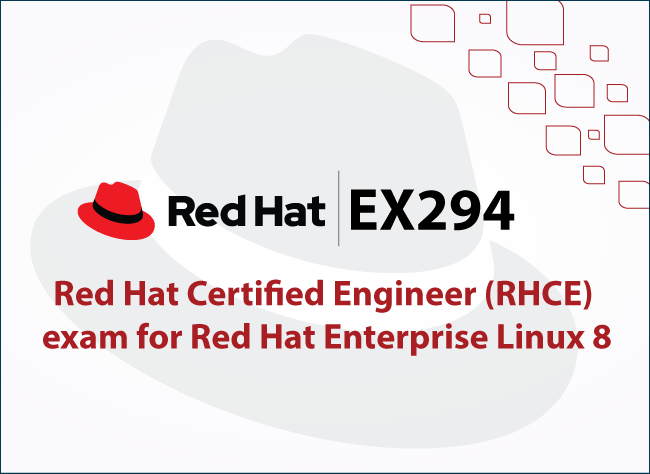- Home
- Infos Certification

EX294 - Red Hat Certified Engineer (RHCE) exam for Red Hat Enterprise Linux 8
The performance-based Red Hat Certified Engineer (RHCE) exam for Red Hat Enterprise Linux 8 (EX294) tests your knowledge and skill in managing multiple systems using Red Hat® Ansible® Engine and executing common system administration tasks across a number of systems with Ansible. The skills tested in this exam are the foundation for system administration across many Red Hat products.
By passing this exam, you become an RHCE®, which also counts toward becoming a Red Hat Certified Architect (RHCA®).
This exam is based on Red Hat Enterprise Linux® 8 and Red Hat Ansible Engine 2.8.
Duration: 4h
COURSE PROGRAM
The performance-based Red Hat Certified Engineer (RHCE) exam for Red Hat Enterprise Linux 8 (EX294) tests your knowledge and skill in managing multiple systems using Red Hat® Ansible® Engine and executing common system administration tasks across a number of systems with Ansible. The skills tested in this exam are the foundation for system administration across many Red Hat products.
By passing this exam, you become an RHCE®, which also counts toward becoming a Red Hat Certified Architect (RHCA®).
This exam is based on Red Hat Enterprise Linux® 8 and Red Hat Ansible Engine 2.8.
- Experienced Red Hat Enterprise Linux system administrators seeking validation of their skills or require a certification either by their organization or based on a mandate (DoD 8570 directive)
- Students who have taken Red Hat System Administration III: Linux Automation with Ansible (RH294) and are on the path to becoming a Red Hat Certified Engineer (RHCE)
- Students who are on the path to becoming a Red Hat Certified Architect (RHCA)
- Systems administrators who want to demonstrate competency in managing multiple systems
- IT professionals who work in a DevOps environment and want to demonstrate competency in automating part of their workload
- Red Hat Certified Engineers who are noncurrent or who are about to become noncurrent and wish to recertify as RHCEs
- Have either taken both Red Hat System Administration I (RH124) and Red Hat System Administration II (RH134) or RHCSA Rapid Track Course (RH199), or have comparable work experience as a system administrator on Red Hat Enterprise Linux
- Have taken Red Hat System Administration III: Linux Automation with Ansible (RH294) or have comparable work experience
- Review the Red Hat Certified System Administrator (RHCSA) exam (EX200) objectives
- Review the Red Hat Certified Engineer (RHCE) exam for Red Hat Enterprise Linux 8 (EX294) objectives
Red Hat System Administration I (RH124), Red Hat System Administration II (RH134), and Red Hat System Administration III: Linux Automation with Ansible (RH294)
As an RHCE exam candidate, you should be able to handle all responsibilities expected of a Red Hat Certified System Administrator, including these tasks:
Be able to perform all tasks expected of a Red Hat Certified System Administrator
- Understand and use essential tools
- Operate running systems
- Configure local storage
- Create and configure file systems
- Deploy, configure, and maintain systems
- Manage users and groups
- Manage security
Understand core components of Ansible
- Inventories
- Modules
- Variables
- Facts
- Plays
- Playbooks
- Configuration files
- Use provided documentation to look up specific information about Ansible modules and commands
Install and configure an Ansible control node
- Install required packages
- Create a static host inventory file
- Create a configuration file
- Create and use static inventories to define groups of hosts
- Manage parallelism
Configure Ansible managed nodes
- Create and distribute SSH keys to managed nodes
- Configure privilege escalation on managed nodes
- Validate a working configuration using ad hoc Ansible commands
Script administration tasks
- Create simple shell scripts
- Create simple shell scripts that run ad hoc Ansible commands
Create Ansible plays and playbooks
- Know how to work with commonly used Ansible modules
- Use variables to retrieve the results of running a command
- Use conditionals to control play execution
- Configure error handling
- Create playbooks to configure systems to a specified state
Use Ansible modules for system administration tasks that work with:
- Software packages and repositories
- Services
- Firewall rules
- File systems
- Storage devices
- File content
- Archiving
- Scheduled tasks
- Security
- Users and groups
Work with roles
- Create roles
- Download roles from an Ansible Galaxy and use them
Use advanced Ansible features
- Create and use templates to create customized configuration files
- Use Ansible Vault in playbooks to protect sensitive data
Create and use templates to create customized configuration files Work with Ansible variables and facts Create and work with roles Download roles from an Ansible Galaxy and use them Manage parallelism Use Ansible Vault in playbooks to protect sensitive data Use provided documentation to look up specific information about Ansible modules and commands
